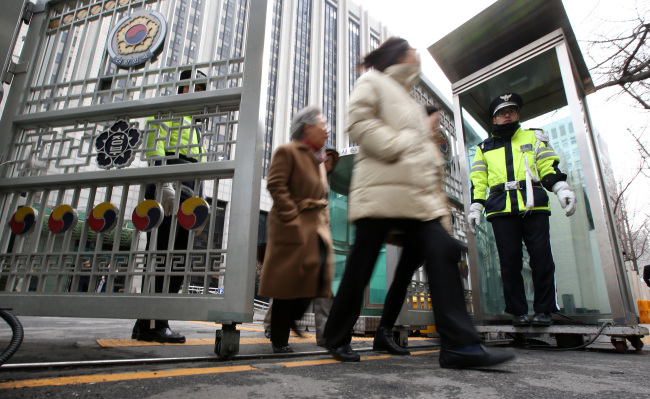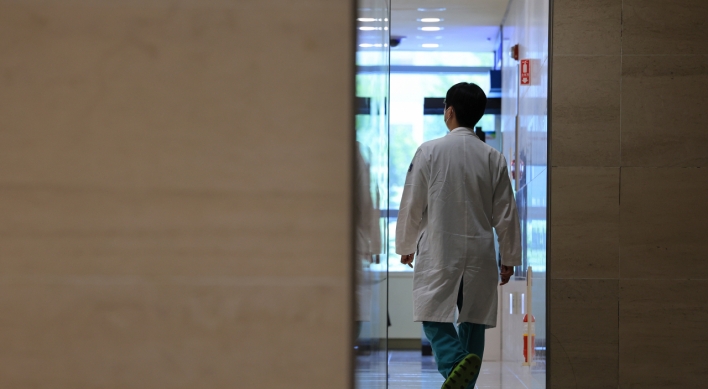The National Assembly on Tuesday passed a landmark anticorruption bill ― ending years of partisan fighting over the details ― that aims to bar all public servants and their spouses as well as journalists and teachers from receiving kickbacks.
The National Assembly voted 226 to four, with 17 abstaining, passing the Kim Young-ran bill, named after the former Supreme Court Justice and ex-chief of the Anti-Corruption and Civil Rights Commission who initially proposed it.
According to the new law, it will be illegal for officials or their spouses to take more than 1 million won ($908), or an equal amount of gifts, in kickbacks. Those who take less than 1 million won will be fined. Journalists, teachers and civil servants will also be subject to the restrictions. Officials will be obligated to report kickbacks suspected to have been taken by their husbands or wives.
Monetary kickbacks will encompass all financial benefits including money, marketable securities, real estate, goods, accommodation vouchers, memberships or coupons.
The National Assembly voted 226 to four, with 17 abstaining, passing the Kim Young-ran bill, named after the former Supreme Court Justice and ex-chief of the Anti-Corruption and Civil Rights Commission who initially proposed it.
According to the new law, it will be illegal for officials or their spouses to take more than 1 million won ($908), or an equal amount of gifts, in kickbacks. Those who take less than 1 million won will be fined. Journalists, teachers and civil servants will also be subject to the restrictions. Officials will be obligated to report kickbacks suspected to have been taken by their husbands or wives.
Monetary kickbacks will encompass all financial benefits including money, marketable securities, real estate, goods, accommodation vouchers, memberships or coupons.

Providing entertainment including eating out, drinking or playing golf will be restricted up to an amount to be set by a follow-up presidential decree. Honorariums for public servants delivering speeches at seminars or writing contributory articles will also be restricted to a certain amount.
The court will be in charge of imposing punishments.
The law will take effect 18 months after it is approved by the Cabinet, which is likely to take place this month.
Tuesday’s vote came after a compromise between the floor leaders of the governing Saenuri Party and the main opposition New Politics Alliance for Democracy late Monday, wrapping up years of wrangling among legislators on the bill’s details.
The first draft, proposed in June 2011, suggested making it illegal for officials or their family members to take a material gift, however small. The bill enjoyed widespread public support, but lawmakers were slow to legislate it, saying the first draft was overly inclusive and harsh.
Christmas presents such as game consoles or chocolates could be considered kickbacks according to the draft, critical lawmakers said. The bill could apply to up to 20 million citizens, in a country of 50 million, they added, as the bill included officials’ extended families.
But public pressure to pass the bill has been mounting since a ferry disaster last April killed over 300, mostly high school students. Known as the Sewol disaster, the accident was mainly caused by relaxed safety oversight over the sunken ferry’s equipment by maritime officials who took kickbacks from the ship’s owners, initial probes showed. Some lawmakers had taken similar bribes, prosecutors alleged.
In January, the Assembly’s National Policy Committee came up with a bipartisan revision to the bill similar to the final version.
But parties had disagreed over details until the last minute, such as whether officials and their families would be obligated to report on each other, the scope of family members that would be affected by the bill and the amount of kickbacks that would be considered illegal.
Debate is likely to continue over the scope of the bill, mainly over the possibility of excessive control by the authorities. Watchers also criticized the bill for omitting clauses directly relevant to incumbent lawmakers.
Saenuri Rep. Kweon Seong-dong claimed the bill would cause distrust within families of public servants. He also alleged authorities could abuse the bill to conduct one-sided investigations into political opponents of an incumbent administration.
Other bills were passed in Tuesday’s plenary session, including one aiming to facilitate crowdfunding for start-ups and another extending the central government’s subsidy for the Hub City of Asian Culture project in Gwangju, among others.
The HCAC is a 5.3 trillion won plan to build new libraries, theaters and research centers for the fine arts in South Korea’s sixth most populous city.
Parties also agreed to set up a special committee to remap voting districts before next year’s parliamentary elections. The Constitutional Court last October had ruled current electoral maps were unconstitutional, as some populous regions were underrepresented in the Assembly.
The antigraft bill’s supporters hope it will raise the public’s trust in government here. South Korea’s public trust levels in officialdom fell from 45 percent in 2013 to 33 percent last year, according to the Edelman Trust Barometer, an annual tally reported by Edelman, the world’s largest independently owned public relations firm.
South Korea’s fall was one of the largest of the 27 measured countries, as the nation ranked 21st overall. The average trust level was 48 percent.
By Jeong Hunny (hj257@heraldcorp.com)
-
Articles by Korea Herald








![[Kim Seong-kon] Democracy and the future of South Korea](http://res.heraldm.com/phpwas/restmb_idxmake.php?idx=644&simg=/content/image/2024/04/16/20240416050802_0.jpg&u=)










![[Today’s K-pop] Zico drops snippet of collaboration with Jennie](http://res.heraldm.com/phpwas/restmb_idxmake.php?idx=642&simg=/content/image/2024/04/18/20240418050702_0.jpg&u=)